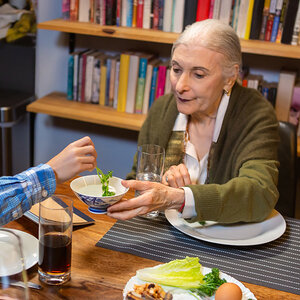Claims Conference secures $1.4 billion for Holocaust survivors

The Conference on Jewish Material Claims Against Germany (Claims Conference) has announced that it has secured approximately $1.4 billion in direct compensation and social welfare services for Holocaust survivors for 2024.
Next year, the Claims Conference will distribute $888.9 million for home care services, including an additional $105.2 million to address the increasing needs of the estimated 280,000 elderly survivors worldwide. In addition, 128,000 survivors will receive direct compensation through a hardship fund that is projected to award $535 million in 2024 with additional annual payments through 2027.
Since 1952, through negotiations with the Claims Conference, Germany has paid approximately $90 billion in indemnification to individuals for suffering and losses resulting from persecution by the Nazis. The Claims Conference allocates funds through a network of 300 social welfare organizations in 83 countries to bolster services such as home care, medical care, emergency assistance, and food distribution.
“For those who were able to flee and survive, they are some of the poorest in the survivor community; the loss of time, family, property, and life cannot be made whole,” said Claims Conference executive vice president Greg Schneider. “While symbolic, these payments provide financial relief for many aging Jewish Holocaust survivors living around the world.”
Funding for Holocaust education—which began in 2022—was also extended to include an additional €38 million ($41.5 million) in 2026 and €41 million ($44.8 million) in 2027 on top of previous commitments through 2025 totaling €100 million ($109.3 million).
“As this last generation of Holocaust survivors wanes, the testimony and lessons they have to share must be remembered,” said U.S. Department of State special adviser on Holocaust issues ambassador Stuart Eizenstat. “It is essential that survivors know…the lessons of the Holocaust will not be lost as we transition from first-hand memories and lived experiences into history.”
(Photo credit: Getty Images/Halbergman)





